Car air conditioning keeps drivers and passengers comfortable, so everyone can enjoy the ride. A working AC is especially important during the summer months. But what if you discover that you have a faulty automotive air conditioner, specifically one that leaks freon? Are freon leaks dangerous? We researched to determine the answer.
Yes, a freon leak can harm your health, particularly if inhaled deeply. It has the potential to deprive your cells and lungs of oxygen. Limited exposure to freon, on the other hand, may be mildly harmful.
So, if you notice a freon leak in your vehicle, you should look for it immediately. It is necessary to repair the leak and replace or recharge the refrigerant.
We now know that freon is harmful to your health. Fortunately, we are here to help you with this concern and explain how freon exposure can affect you, how to fix it, and what these various types of car refrigerants are, so keep reading until the end to learn more.
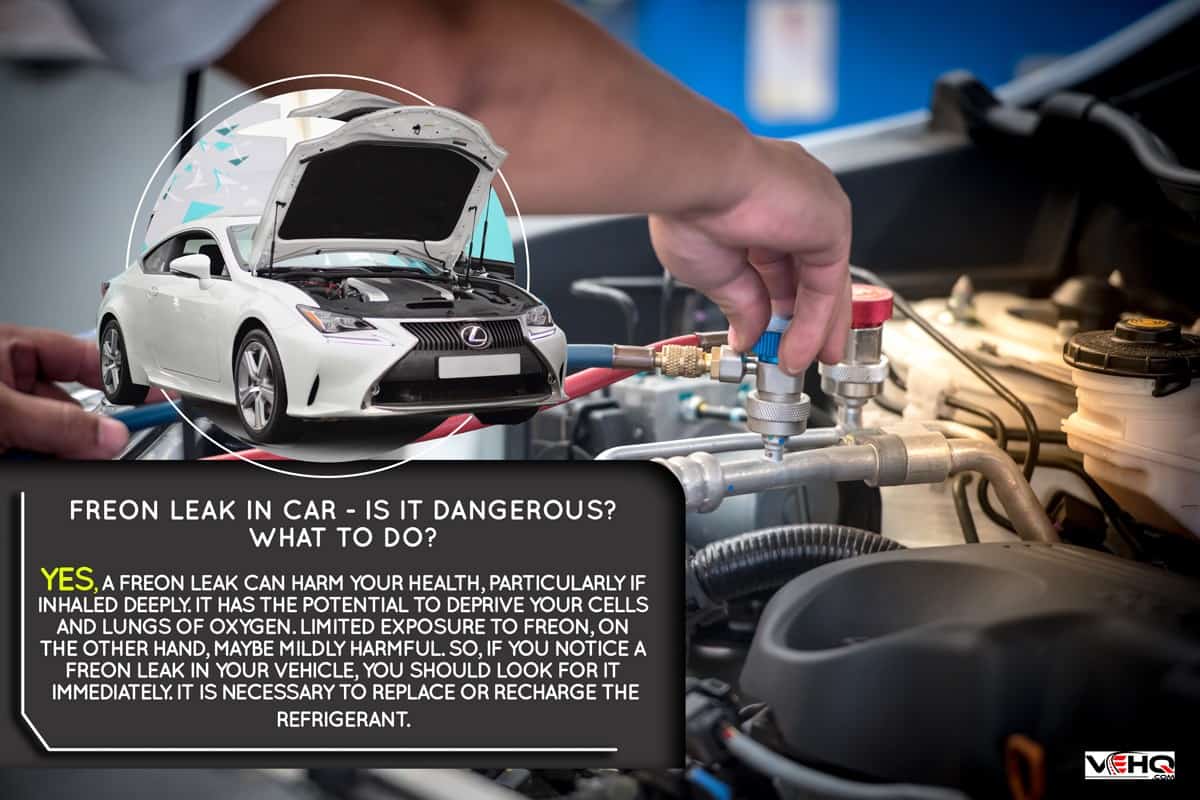
Can Freon Make You Sick?
Freon can cause eye irritation and, if inhaled for an extended period, can cause short-term symptoms such as headaches or dizziness. Freon can also pose a health risk to those who work with it regularly; long-term exposure can lead to more severe issues, such as kidney, liver, and heart damage.
Different Refrigerant Types Used in Car Air Conditioners
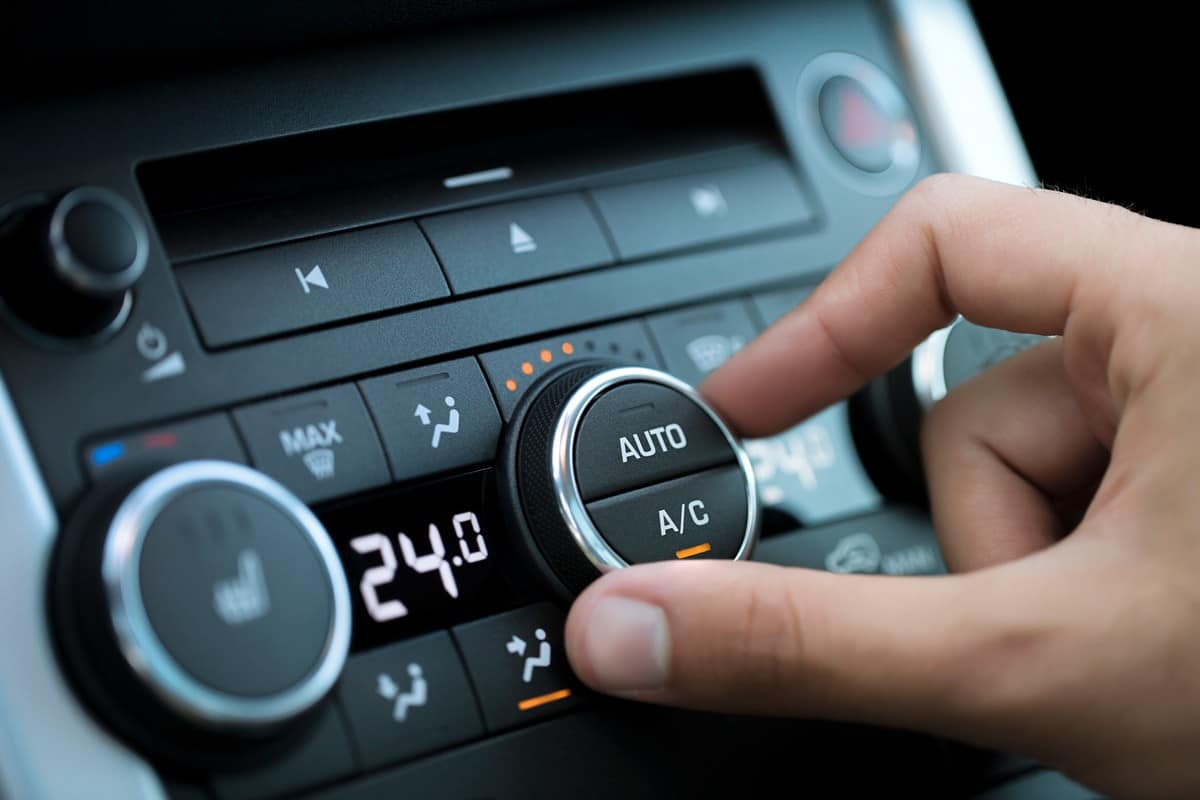
The first thing you should know before recharging your automotive AC system is what type of refrigerant it requires. For vehicles, there are three main refrigerant types or freon types.
R12 Freon
Until around 1995, this freon was considered universal in vehicle air conditioners. This low-cost refrigerant is no longer used because of its negative effects on the ozone layer and the environment.
R134a Freon
This type of freon is very popular nowadays because of its low flammability. Although this refrigerant is gentler on the ozone layer, it is still not the most environmentally friendly refrigerant for vehicles.
The chemical is a greenhouse gas. This is a far superior freon to R12, but it will still face some competition.
Click to see this product on Amazon
R1234yf Freon
This new refrigerant performs similarly to R134a, but with one significant difference: it diminishes much faster in the upper atmosphere. This means it will contribute less to global warming. It's also simple to convert a car's AC system from R134a to R1234yf.
Click to see this product on Amazon
Signs Of A Freon Leak
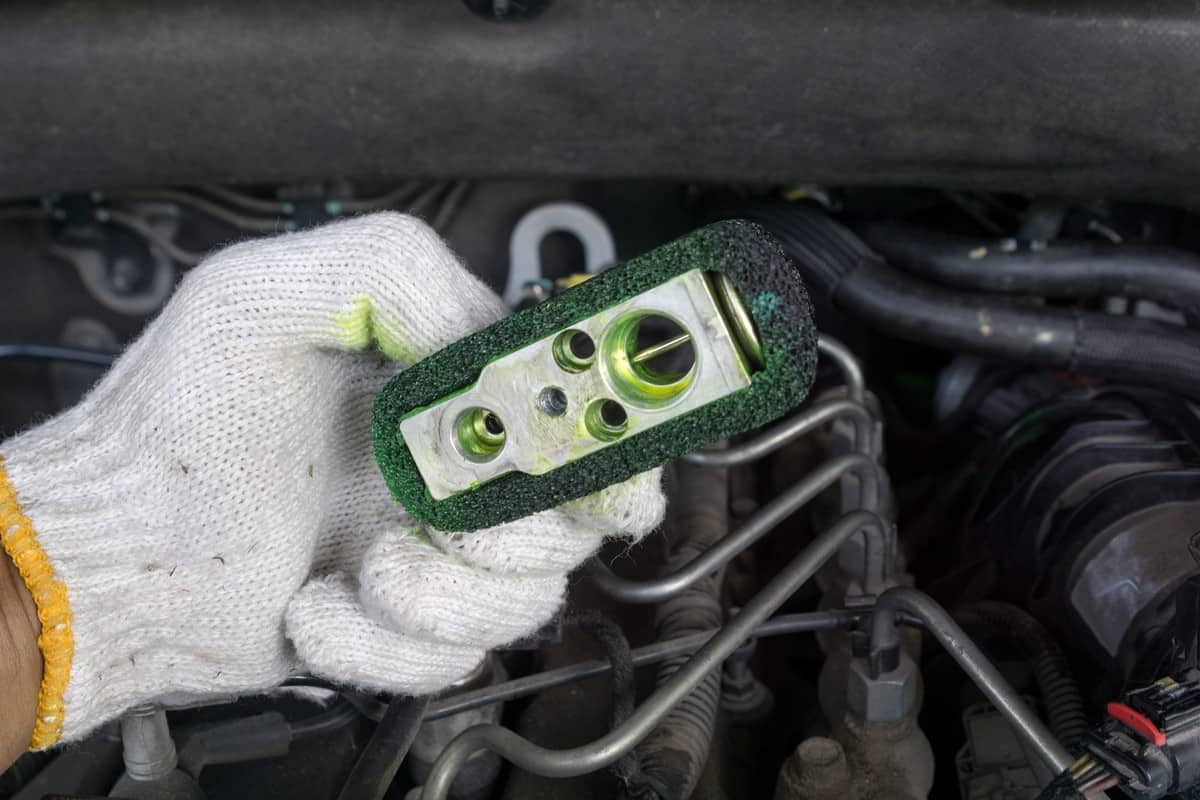
A refrigerant leak in a vehicle's air conditioning system should be investigated. The ability of the air conditioner to cool is reduced when fluid leaks and the compressor is put under strain. If enough refrigerant leaks out, the air conditioner will eventually fail.
You don't need to be an HVAC expert to detect refrigerant leaks in your air conditioner. Knowing the signs of a refrigerant leak is important for repairing the line sets and restoring your air conditioning system to a functional, efficient state.
Blowing Warm Air
If your air conditioner is blowing warm or room temperature air, this is one of the most obvious signs of low freon levels. Your vehicle's air conditioning system works by circulating this pressurized refrigerant. When the amount drops too low, performance is poor.
Clutch Doesn't Engage
When you turn on the air conditioner, the compressor clutch in the cooling system engages and transfers power from the engine to the AC compressor. When this occurs, you should hear it engage as it reads the freon levels, and the compressor kicks in to pressurize it and start cooling the air.
If you turn on the air conditioner and don't hear the clutch click, it means there isn't enough refrigerant to pressurize the compressor. To put it another way, your air conditioner has nothing to work with.
Visible Refrigerant Leaks And Unusual Sounds
Your air conditioner could be leaking refrigerant if it makes a hissing sound. Because the chemical refrigerant is kept at high pressure, it hisses as it exits the coil.
Visible leaking is another more serious symptom of low freon levels. If you notice a leak, it will be freon if it appears as a "thin" greasy substance. These leaks frequently appear under the hood, around the compressor, inside the cabin, or beneath your vehicle.
If you notice leaking, go to your nearest auto repair shop and have a certified technician diagnose the problem and repair your vehicle's air conditioning.
Your Dashboard Alerts You
When the refrigerant level reaches a critical level, an early warning light may show on the dashboard. That is an indication that the system is leaking and that you must repair the car's air conditioning leak.
Ice Around The Compressor
If you see ice around the compressor in your air conditioning system, moisture may be present, indicating that there is an opening, which also means coolant is leaking out.
What Causes Air Conditioning Leaks In A Car
It's all too easy for air conditioning issues to sneak up on you. If your air conditioner is blowing warm or hot air, you can assume it is low on refrigerant or has a leak. While leaks are not the only cause of a faulty air conditioner, they can be caused by a number of issues or failures, such as:
Natural Wear-And-Tear
Some parts, like most components, can wear out over time. A refrigerant leak in the system can be caused by a broken gasket or seal, a cracked hose, or another component. Furthermore, some refrigerant naturally breaks over time, but in such small amounts that it would take a very long time for the vehicle to blow warm air.
Damage Caused By Road Debris Or Accidents
Stones, rocks, potholes, and other road hazards can cause under-car damage. Additionally, some components may have been damaged if the vehicle was involved in an accident. It is best to have the vehicle inspected following any accident or if you have any rough riding conditions to ensure no damage to any vehicle system or part.
Road Salt And Brine
Unlike a home air conditioner or a refrigerator, the air conditioning system in a car is not contained within a single unit. To function properly, the parts in your vehicle's air conditioning system are dispersed throughout the vehicle. This means that some portions are exposed to road salt and brine used during the winter months, which can eventually lead to corrosion of those parts.
Moisture
If a rubber hose, seal, or other component fails for whatever reason, moisture enters the system. Moisture reacts with the refrigerant, forming an acid that degrades other components and causes pinhole leaks.
How To Repair A Leaking Car Air Conditioner?
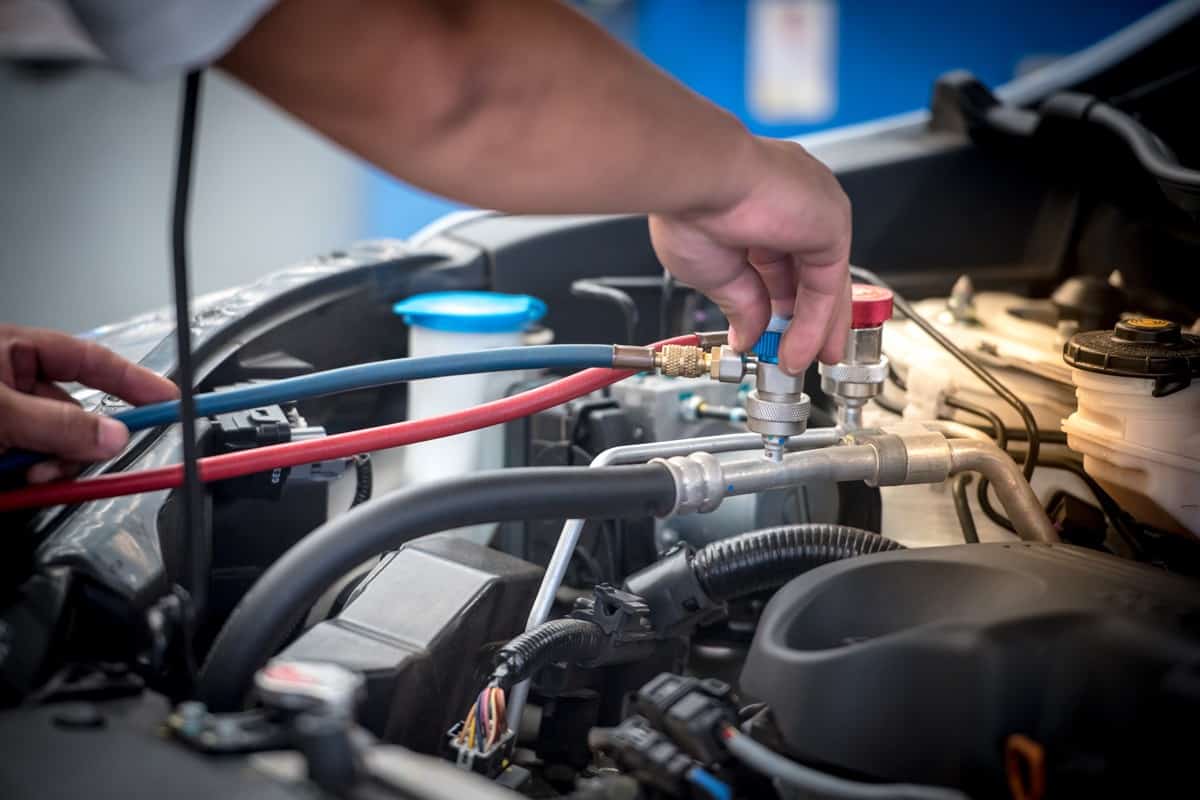
If there is a refrigerant leak, a car air conditioner leak can be easily repaired by yourself. Make sure you purchase the appropriate auto accessories, parts, and tools to repair AC leaks in the following scenarios:
- A leak sealant can repair a small and slow leak in the cooling system.
- In the case of a large leak, you must vacuum the air conditioner before adding refrigerant.
The two methods for car AC leak repair are as follows:
How To Repair A Minor Car Air Conditioner Leak?
A small AC leak in a car will gradually reduce the performance of the car air conditioner until it stops working completely. As a result, use a leak sealant to repair minor leaks. This is a low-cost, hassle-free, and quick method for repairing minor and slow leaks.
To seal the area, a leak sealant is added to the car's air conditioning system and mixed with refrigerant on a low-pressure line.
Click to see this product on Amazon
How To Repair A Large Car Air Conditioner Leak

If the leak in the car's air conditioner is large, the leak sealer will not help. You must follow the instructions carefully. Purchase auto parts and tools that will assist you in properly repairing AC leaks. Refrigerants, gauges, and vacuum pumps are among the tools and parts required.
STEP 1
Before adding refrigerant, vacuum out the car air conditioner. Other leaks can be identified by running AC in a vacuum.
STEP 2
Repair the leaking part; if it is beyond repair, simply replace it.
STEP 3
After replacing the worn-out part, re-add the refrigerant into the AC system while it is still in a vacuum state. If you don't use the correct amount of refrigerant, your car's air conditioning won't work, and overfilling can damage various parts of the vehicle.
After replacing the worn-out part, add refrigerant back into the AC system while in a vacuum state. Ensure to add the right amount of refrigerant, else the car AC won't work, and overfilling may damage various parts of the vehicle.
It is important to note that every car operates at a specific pressure, so when adding refrigerant, use gauges to ensure that it is poured back into the system at the correct pressure. Details about car pressure can be found in the owner's manual that came with your vehicle.
It's A Wrap!
Inhaling refrigerants is seriously harmful, especially if it is deeply inhaled. The longer you wait to inspect and repair any damage to your unit, the more vulnerable you are to health problems. So, if you notice a car freon leak, inspect and repair it as soon as possible. And we strongly advise you to have your car serviced by a certified air conditioning technician.
Made it to the end? Here are other articles you might find helpful:


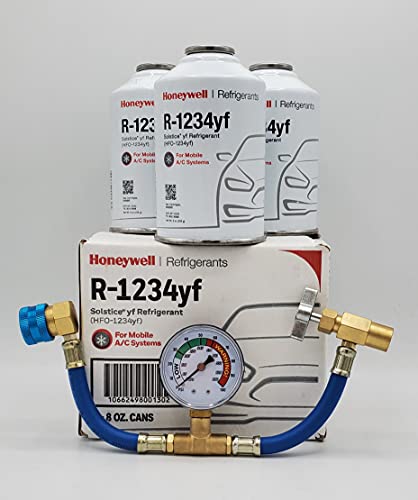

If you own an older car, you may consider replacing your current air conditioning system with one that uses a more environmentally friendly refrigerant, such as R1234yf. The initial cost may be high, but it will pay off in the long run by reducing your carbon footprint and protecting the environment. maybe help